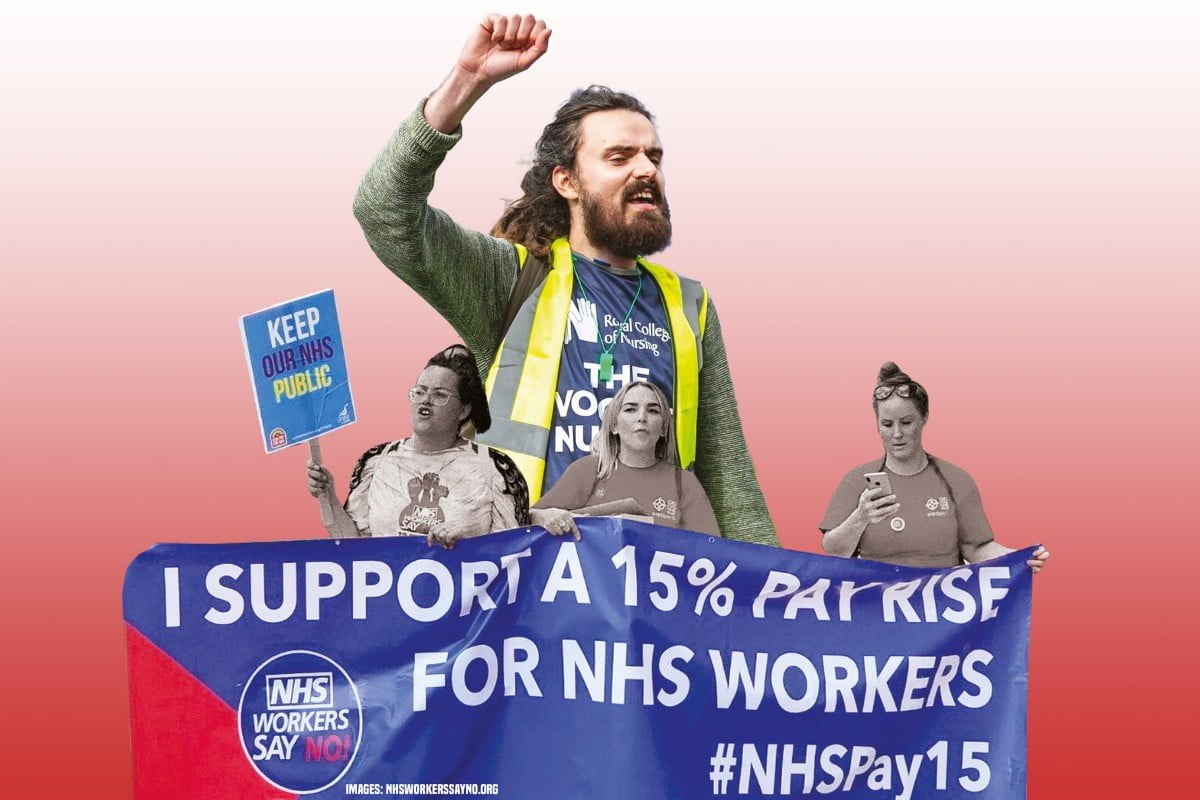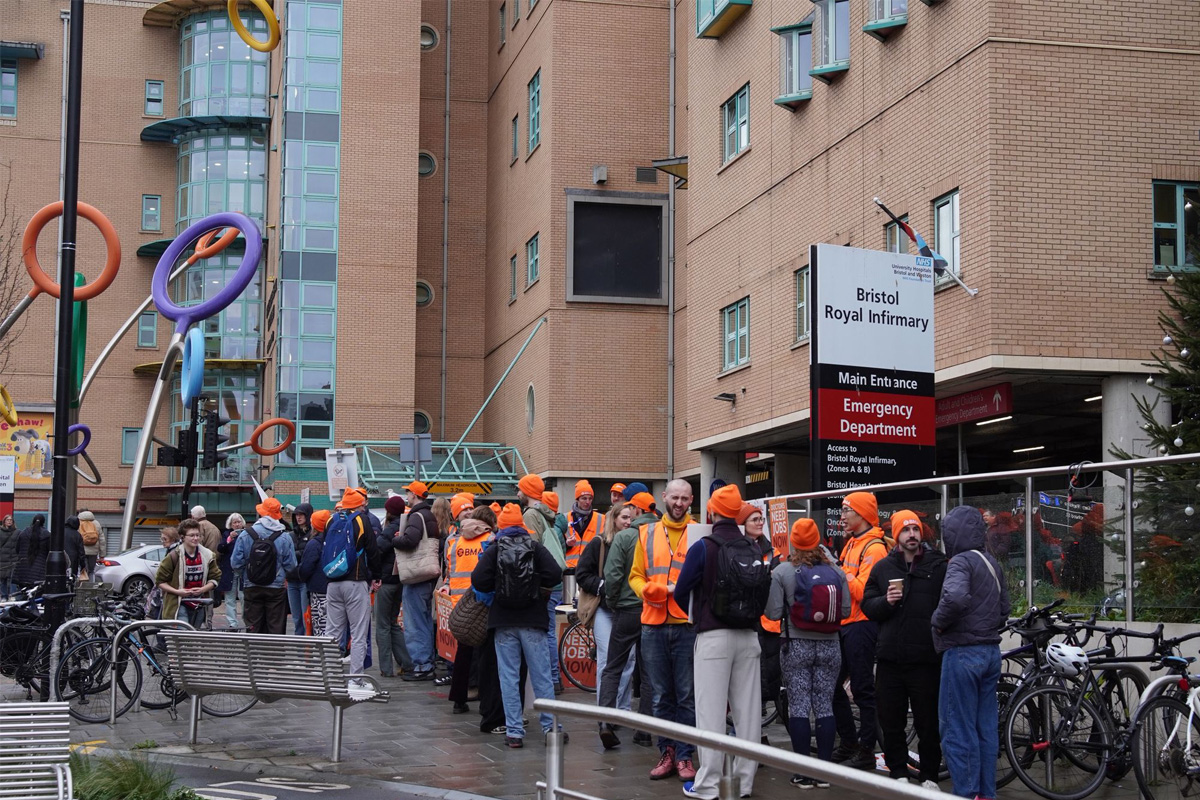This week, junior doctors organised in the BMA have taken their second round of strike action this year. Following a 72-hour strike last month, they have now undertaken a 96-hour strike from 11-15 April.
This is the longest ever strike of doctors below consultant grade. Coinciding with the Easter bank holidays, it has had a real impact, showing the huge importance of these junior doctors in providing care for patients.
These strike days also come to an end as the ballot closes in relation to the government’s rotten deal to health workers in the RCN, Unison, GMB, and Unite. The leading bodies of all of these unions, with the notable exception of Unite, shamefully recommended acceptance of this below-inflation pay offer to their memberships.
As we go to press, Unison has announced that members have unfortunately accepted the offer, by a 74 percent majority.
RCN members have voted to reject the offer, however. This rank-and-file defiance of the leadership’s call to accept paves the way for militant explosions in the union, and for further action by nurses. A 48-hour strike is already scheduled for the first May bank holiday, and further walkouts could follow in the months after.
Clearly, despite the capitulation of many of the leading elements, this wave of class struggle in the NHS is far from over.
Struggle
Officially, the BMA strike was called in response to over a decade of pay erosion, as junior doctors’ have seen their pay cut by as much as 26.1 percent since 2008. With the present cost-of-living crisis, this has now become unbearable, leading to the historic 98 percent vote for action.
Also motivating junior doctors, as with all NHS staff, is how poor pay and conditions are leading to staff shortages. There is an ongoing exodus of junior doctors to countries like Australia and New Zealand. Those doctors who remain behind, meanwhile, report having to work many unpaid hours to make up for this shortfall.
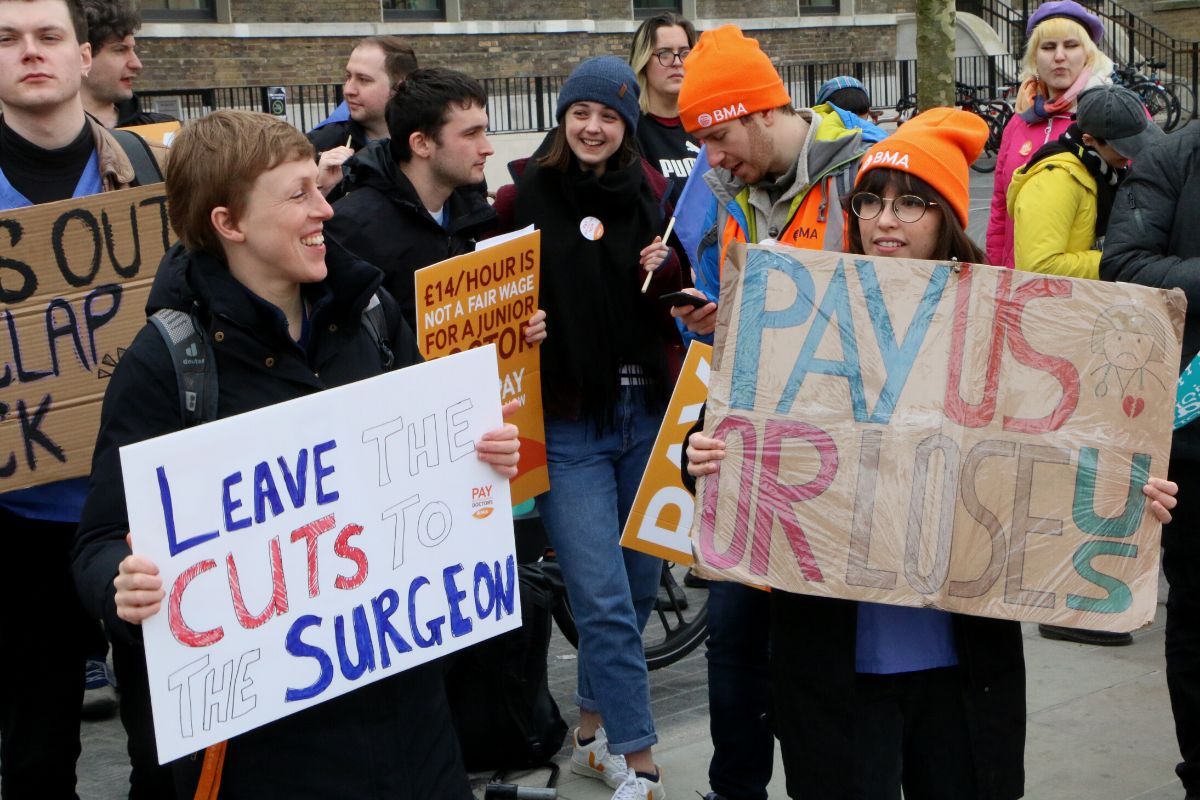
These shortages not only make the lives of NHS staff increasingly unbearable, but also have a detrimental effect on patient safety. Just this week, it was reported that, in February, 1-in-10 patients seeking emergency medical help in England had to wait for over 12 hours.
Compounded by austerity, a poorly-functioning NHS that feels like it’s on the brink of collapse provides the perfect excuse for further privatisation by the Tories.
Such proposals are gleefully echoed by Blairite Shadow Health Secretary, Wes Streeting, who has repeatedly advocated utilising the private sector to “bolster” the NHS.
Today, private companies are already hoovering up as much as 25 percent of NHS spending, amounting to tens of billions of pounds.
These strikes are therefore part of a struggle for the very future of the NHS itself – a historic concession won by the working class that must be defended by all means necessary.
Determination
Our supporters inside the BMA – along with Socialist Appeal activists who have gone to picket lines to show solidarity in Durham, Leicester, London, Isle of Wight, Ipswich, Sheffield, and more – have reported that members are more determined than ever to continue their struggle.
Durham Marxists were at University Hospital Durham where there was a desire to fight among junior doctors. Overwhelming public support kept morale high. The doctors were agreed on the need for militant leadership in order to see their struggle out. pic.twitter.com/a3PCu6CMvJ
— Durham Marxists (@DurhamMarxists) April 13, 2023
Everywhere, it seems that doctors are optimistic about the prospects for victory. They are especially bolstered by the overwhelming support from the public also, with 54 percent saying they back their action in one recent poll.
This figure is particularly remarkable given the major impact on everyday life caused by the strikes, alongside the constant barrage of vicious propaganda from the Tory press about the BMA.
Chants like: “No cuts! No losses! Take it from the bosses!” have also resonated with striking doctors, who see NHS bureaucrats on six-figure salaries, while juniors have to resort to loans and food banks.
The hypocrisy of the Tories and NHS tops are not lost on these workers either. As one worker in Southampton told our comrades: “They say 35 percent is too much for a pay rise, but it’s not too much for a pay cut!”
“They rely on our humanity because they don’t have any!” he went on to say, referring to the Tories’ expectation that doctors should simply put up with having to do unpaid overtime.
On other picket lines our comrades have discussed with doctors about the recent days of strike action in France, against Macron’s attempts to hike the retirement age, and the need for similar mass coordinated action in Britain to bring down the Tories and the bosses’ system.
Negotiations
So far, the BMA has been met with indifference and intransigence from Tory health secretary, Stephen Barclay, who has demanded that the strikes are suspended before talks can begin.
Furthermore, Barclay has ruled out pay restoration as “unreasonable”. A Downing Street spokesperson, meanwhile, stated that the BMA’s demands are “completely out of step with other workers in the public sector”, referring to the government’s negotiations with other NHS unions.
Disgracefully, Labour leader Keir Starmer agreed with the Tories’ assessment that the junior doctors’ demands are “unaffordable”, without uttering a word about the obscene sum extracted from the health service by private profiteers.
Previously, during the first set of strikes earlier this year, the billionaire-owned media seemed to be implementing a total blackout. Now they have turned to parroting the Tory’s lies about the so-called precondition of a 35 percent pay offer set by the “hard left” and “militant” BMA leadership, along with stories about cancelled cancer operations.
At the same time, the government has so far rejected the BMA’s call for entering negotiations brokered by ACAS.
The BMA have correctly continued and escalated their action compared with other NHS unions. But we must warn against seeing ACAS as a neutral arbiter, and about the dangers of conceding to pressure from the Tories to accept their below-inflation offers.
In any case, Barclay and the government have been playing for time, waiting to see if other health workers would accept their derisory pay offer. They were gambling on nurses voting to accept, which would have served as a useful stick with which to beat back the BMA.
The rank-and-file rebellion in the RCN has scuppered their plans, however, paving the way for potential coordinated action between junior doctors and nurses in the coming weeks and months.
Rank-and-file revolt
The actions of the RCN leadership – and general secretary Pat Cullen in particular – have only aided the Tories in their divide-and-rule attempts. Not only did Cullen and co. recommend that members accept the offer, but they threatened workers by saying that this rotten deal was the best that they would get.
Furthermore, the RCN leaders also indicated that they would “look into” a separate pay spine – i.e. actively separate the nurses’ struggle from that of other health workers.
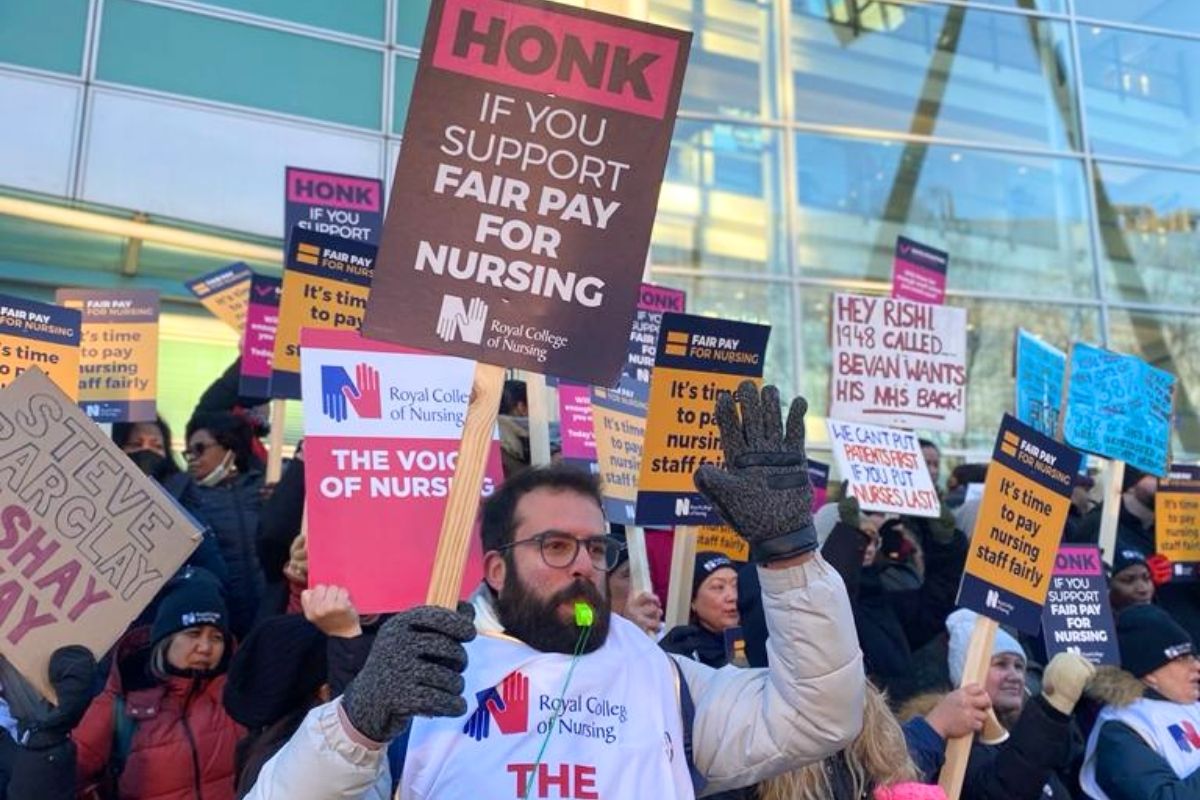
In response to the shameful actions of their leadership, rank-and-file health activists organised a cross-union campaign called ‘NHS Workers Say No’, which mobilised members to reject the Tories’ offer. In doing so, however, they faced staunch opposition from the RCN bureaucracy, in particular.
Grassroots activists involved in this campaign have reported to Socialist Appeal (see below) that they have faced bullying tactics; that ‘reject’ posters have been torn down in workplaces; and that critical WhatsApp messages have been deleted from group chats.
Incredibly, in one case, the police were even called in (presumably by capitulating union bureaucrats) to investigate RCN members, following an apparently “fraudulent” petition.
Given these repugnant methods and lack of fighting leadership, it is little wonder that some rank-and-file union members have been demoralised and have voted to accept.
After all, how can workers have any confidence in their leaders, when they’re clearly so eager to throw in the towel at the first opportunity? This helps to explain the disappointing Unison result.
Nevertheless, the successful rejection vote by RCN members is a tremendous victory for the rank and file, which will hopefully galvanise those colleagues who remain in dispute to follow suit.
Coordinated action
To advance, these disputes require unity – not only in words, but in action. The desire for coordinated struggle is palpable on the picket lines. And even before the current strikes, conversations on the wards, reportedly, have often turned to the need for hospital-wide walkouts in some places.
As one impassioned junior doctor told our supporters: “If everyone in every hospital went on strike together, the government would give us a pay rise immediately!”
This highlights the way forward. If NHS union leaders prove unwilling to continue and unite these disputes from the top – or worse, to make dodgy backroom deals with the Tories – then members must respond with unity, mobilisation, and coordination from below.
To this end, cross-union rank-and-file strike committees should be established in NHS workplaces in order to coordinate action on the ground. If these were to link up across different hospitals and trusts, it would put enormous pressure on the union leaderships, and would help to escalate and strengthen the struggles in the health service.
Socialist policies
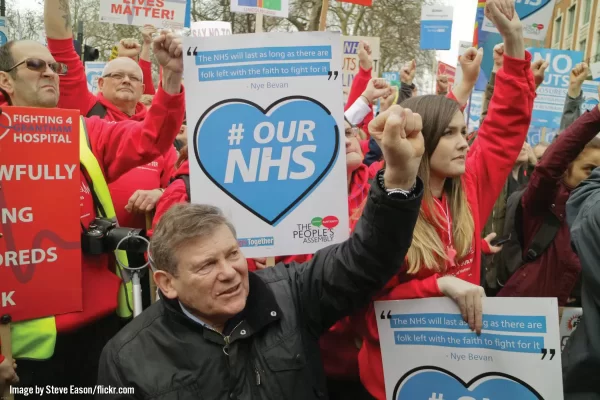
Currently, the BMA is in a very strong position. Our strike is generally very popular, while the Tories are not.
To take the struggle forward and win for NHS workers, what is required is militant leadership and rank-and-file organisation .
The union leaders must be unafraid of telling the truth. This means linking the poor pay and conditions in the NHS to the question of austerity and privatisation, and voicing how we can boldly counter these ills with clear socialist policies.
Alongside our struggle for pay restoration, therefore, we must fight for a fully-nationalised NHS – properly funded through the expropriation of private healthcare providers, Big Pharma companies, and the big banks; and managed democratically by the working class, as part of a socialist planned economy.
Such demands – linked to a broader socialist programme, fought for by the wider labour movement on the basis of mass coordinated action and protests – could mobilise millions in the struggle against the Tories, against austerity, and against capitalism.
Letter from an RCN activist: ‘The Voice of Nursing’?
Maxine Wade, RCN activist
[This letter was published in issue 385 of Socialist Appeal. Subscribe here.]
After six days of historical industrial action, the Royal College of Nursing (RCN) called off its first 48-hour strike to engage in government negotiations, much to the dismay of many of its members.
After secretive negotiations took place, we were recommended a 5% pay increase – a far cry from the 19% pay increase we have been campaigning for.
Worryingly, the RCN has doubled down on its push for members to accept this pay offer. I have experienced this myself, in my attempts to organise a ‘Vote Reject’ campaign locally.
Vote Reject posters have been torn down, members critical of the union leadership have been intimidated, and even shouted down in their local branches.
Reportedly, branch secretaries have been deleting critical comments from nurses’ WhatsApp groups and warning them about putting up any further posters. All of this confirms the findings of last year’s Carr report into the union’s toxic bullying culture.
Further to this, a recent petition, calling for the RCN to stage an emergency general meeting (EGM) to discuss the leadership’s poor handling of the dispute, has been labelled as “fraudulent” by the union leaders. Outrageously they have reported this to both the NMC (the nursing governing body) and even the police!
To add insult to injury, the RCN has threatened that any further petition would not be accepted. The RCN has no other governing mechanism for the union membership to raise concerns, other than an EGM.
We have over 175,000 NHS vacancies and have lost over 40,000 nurses in the past year alone. We cannot afford to lose any more. And we cannot be suffocated by overpaid union heads who fail to see that the union should serve its members – not the other way around.
The RCN should be amplifying workers’ voices in this struggle – not stifling them. After all, isn’t this the union that calls itself ‘The Voice of Nursing’?

